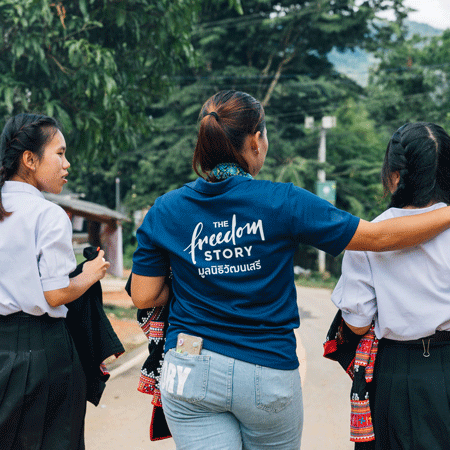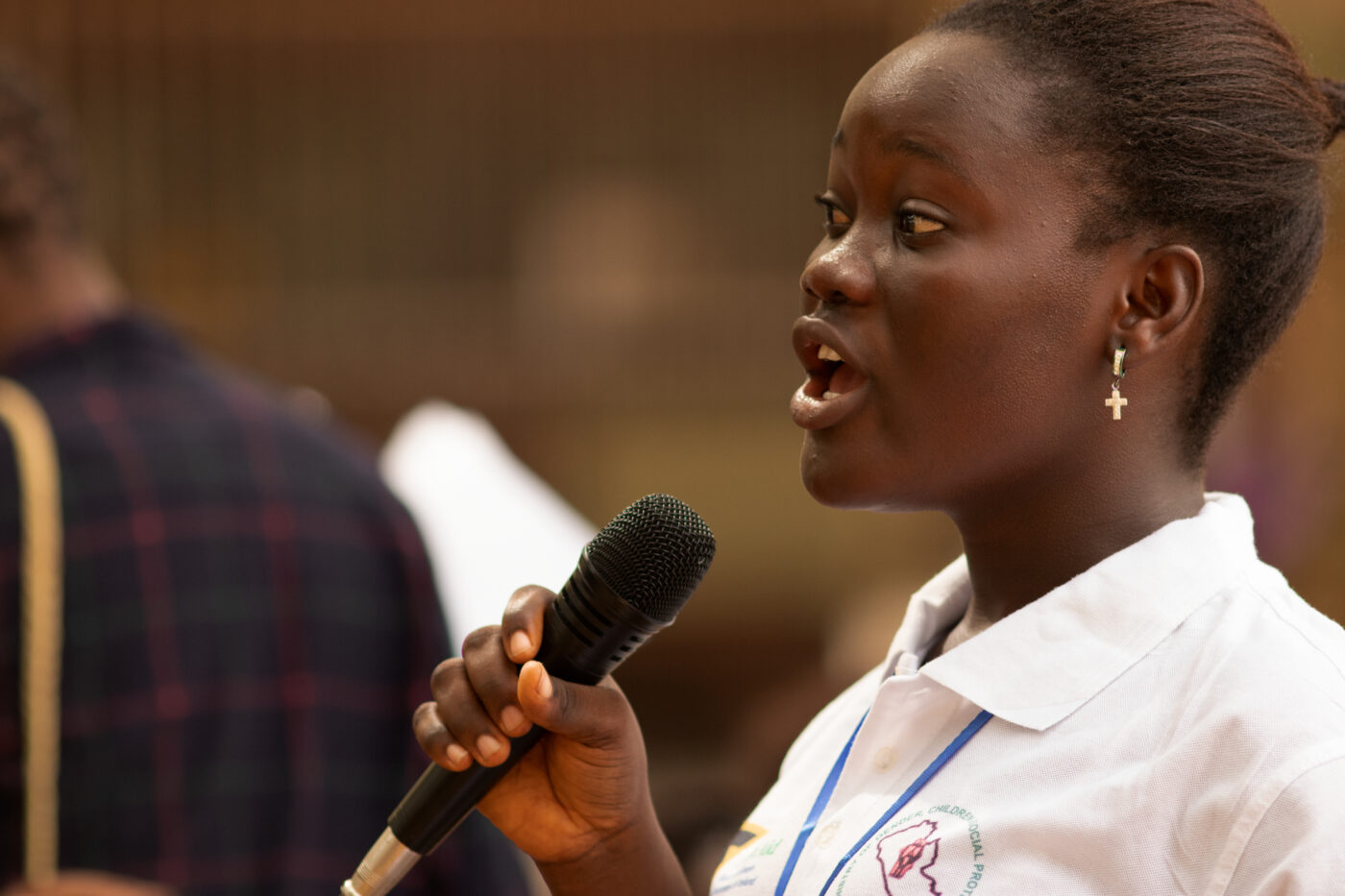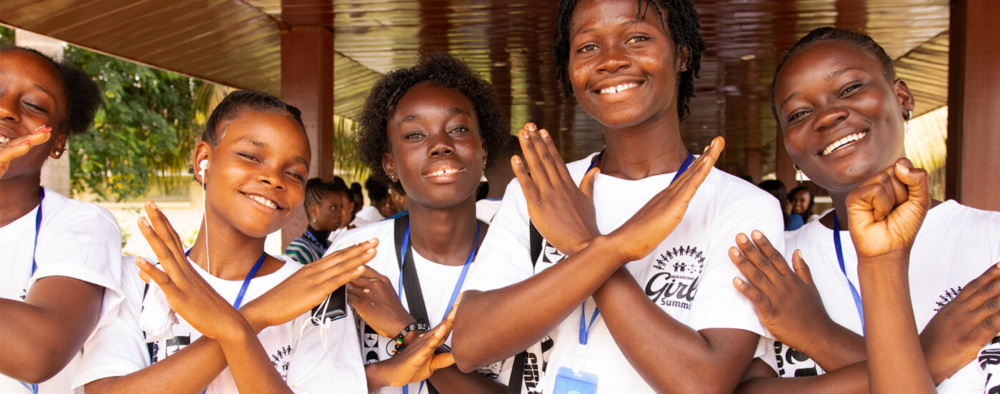
Segurança e bem-estar
Educação, Justiça de gênero, Segurança e bem-estar, Poder da juventude
[image_caption caption=”A young woman delivering calls to action directly to the Vice President of Liberia at the West Africa Adolescent Girls Summit. © Global Fund for Children” float=””]

[/imagem_legenda]
Gitta Brima, I’m 19, and I’m from Waiima, Baoma Chiefdom, Bo, Sierra Leone.
Professor William Daniel Mattia, I’m 17, and I’m from Bo town, Sierra Leone.
Khalida Mariama Tamu, I’m 18, and I’m from Kenema, Sierra Leone.
Stanley Swaray, I’m 17, and I’m from Kenema, Sierra Leone.
Tity Memunatu Samantha Sannoh, I’m 17, and I’m from Waterloo Freetown, Sierra Leone.
Gitta: When I learned that the summit was designed to attract adolescents from diverse backgrounds, I decided to attend to learn about issues that affect us adolescents from different perspectives.
Professor: I decided to attend because both boys and girls should work as one body to achieve equality.
Khalida: Several opportunities, such as getting a platform to interact with my peers, getting a learning space for exploration, and building my advocacy skills, raised my urge to attend.
Stanley: I decided to attend because I knew that the occasion would be graced by many dignitaries, so sharing my thoughts directly with them would be very easy.
Tity: I decided to attend because I always believed that success and learning take place when you leave your comfort zone, and I wanted to gain some ideas and share mine with other adolescent girls.
Gitta: I had mixed feelings. I felt good that I had learned a lot of life-changing skills and perspectives. I also felt bad when I learned about the negative consequences of female genital cutting, because I’m a victim.
Professor: After the summit, I was experiencing serious medical issues and had surgery.
Khalida: Immediately after the summit, I felt that it was great, as it created a safe space to discuss sensitive issues that society has long frowned on talking about; brought friendships, which have now transformed into sisterhood; and taught me to own the space, building my self-confidence/self-esteem and having at the back of my mind that yes, I can and women can, if only we fight for it.
Stanley: I remember feeling positive and optimistic about the things we wrote in the position paper.
Tity: I felt something great within myself, I was so happy because I met with different girls from different countries, the fun and the learning process were great, and it was life changing.
Gitta: I feel good about the summit, as it capacitated me a lot. Before the summit, I thought female genital cutting was a good practice, as this is what our people made us to believe. But the summit taught me that it affects the wellbeing of girls, thereby changing my perspective about many such issues.
Professor: I feel great now, and all thanks to the adolescent influencers and partners for their support.
Khalida: The summit created the platform to unlock my true potential by raising my self-esteem. Now I am happy with my gender, and it feels great to own the space, and I shall continue owning it.
Stanley: I feel fulfilled because my intention of going to the summit was achieved. Realizing how wonderfully and wholeheartedly my colleagues sent the message across through the position paper, I felt that our dreams as workers of changes were finally coming through.
Tity: I am still having the spirit of the summit, am always feeling it happen again.
Gitta: The biggest thing I learned was comprehensive sexuality education, which taught me that I have autonomy over my body.
Professor: I learnt about comprehensive sexuality education.
Khalida: The biggest thing I learnt was that the concept of women being the weaker vessel is all fallacy and is a result of culture, tradition, and society, which has led to suppression of our rights and to women having low self-esteem. With time, it can change, but it all has to start with us women believing in ourselves.
Stanley: The biggest thing I learnt was that we children and adolescents have the capacity to make meaningful decisions when it comes to securing our rights, welfare, and dignity.
Tity: The biggest thing I learnt is comprehensive sexuality and menstrual hygiene, and that I own my body, and nobody has the right to touch it.
Gitta: I used to be a shy person, but as a result of the summit, I am now outspoken. In my community, with support from CASE SALONE, I engage adolescents on a weekly life skills program, and I also engage my peers in school about their rights and responsibilities. I’m now a proud influencer and a champion for change.
Professor: I am educating my community about comprehensive sexuality education because it teaches us about our bodies and how to take care of them, and I am seeing stakeholders in Sierra Leone to discuss adding comprehensive sexuality education into the school curriculum.
Khalida: I am now developing content to launch a feminist movement on campus to sensitize women on their rights, ability, and capabilities. In advocacy to end sexual and gender-based violence, I have realized that men must be involved in the process, so we have tried to include both boys and girls in changing their mindsets.
Stanley: My work is to ensure that we start practicing the things we spelled out in the summit position paper right in our own community, and I have upscaled my advocacy work.
Tity: Previously, I was that shy girl that hardly talked or participated in any discussion about the issues girls are facing, but since the summit, I have built my confidence and focus on my goals as a girl. In my community, I started engaging girls and young women about female genital cutting, the harmful effects of it, and teach them the importance of menstrual hygiene.
Gitta: My goal is to either be a nurse or an entrepreneur.
Professor: I hope to bring comprehensive sexuality education to all in West Africa.
Khalida: My goal is to continue my education and become an independent successful woman who can strive without a man. Also, I aim to be a lawyer for women, a positive change maker in my community, especially for children.
Stanley: I hope to dismantle gender inequity and help both girls’ and boys’ triumph over these challenges.
Tity: My goal is to open a big foundation where I will produce menstrual pads and body odor spray and cream for girls who can’t afford to buy them. And I want to become the greatest female accountant in and out of Sierra Leone.
